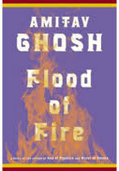 “Flood of Fire,” the final novel in Amitav Ghosh’s wonderful set of historical novels the Ibis Trilogy, covers the years 1839-1841 and brings the history up to the early months of the first Opium War. Like its two predecessors, “Flood of Fire” stands on its own, but the resonances are deeper and the ironies considerably more acute for the reader who has read the earlier books. (They are “Sea of Poppies,” reviewed here, and “River of Smoke,” reviewed here.) “Flood of Fire” follows several characters peripheral to the action in the earlier books and allows us to renew our acquaintance with others.
“Flood of Fire,” the final novel in Amitav Ghosh’s wonderful set of historical novels the Ibis Trilogy, covers the years 1839-1841 and brings the history up to the early months of the first Opium War. Like its two predecessors, “Flood of Fire” stands on its own, but the resonances are deeper and the ironies considerably more acute for the reader who has read the earlier books. (They are “Sea of Poppies,” reviewed here, and “River of Smoke,” reviewed here.) “Flood of Fire” follows several characters peripheral to the action in the earlier books and allows us to renew our acquaintance with others.
Each of the main characters is in search of something. Keshri Singh is a sepoy or Indian soldier serving the British, and, as it happens, brother to Deeti, the main character of the first novel. He volunteers for a deployment to China, hoping it will bring him back to a safe retirement in his village. Zachary Reid, former first mate of the Ibis and now struggling to make a living in Calcutta–who has played crucial roles in the first two novels–is central to the action here as well, as he manipulates the feelings and needs of various wealthy persons to build the foundations of stability and wealth for himself. Neel, formerly the Raja of Raskhali, remains in China, where he works, though his heart remains in India (as do his wife and son). Shireen Modi, of Bombay, wife of Bahram Modi, a central figure in the second book, is persuaded to leave her city. She has lived most of her life in seclusion, but her husband’s bankruptcy and death leave her destitute, and she is persuaded that her presence will increase the likelihood of recovering some of the losses. Ghosh twines their stories together as each travels to the triangle formed by the cities of Macau, Guangzhou (Canton) and Hong Kong – the latter still an island that is transferred to the British Crown in the course of the novel.
These characters take part in the events that lead up to what will be known as the First Opium War. The Chinese have stopped the foreign merchants from selling opium (imported from India) to their people, and the foreigners, the British in particular, are extremely unhappy. Fortunes have been lost and once-wealthy and powerful men who have spent years voyaging to and remaining in a foreign country risk serious losses. Their talk is of free trade and the glories the advanced British civilization brings to the East, but the subtext is money and power, caste and position. American readers may find the British justification for the opium trade Ghosh describes familiar:
The demand came from Chinese buyers and if the British did not meet it then others would. It was futile to try and hinder the flow of a substance for which there was so great a hunger. Individuals and nations could no more control this commodity than they could hold back the ocean’s tides: it was like a natural phenomenon–a flood. Its flow was governed by abstract laws like those that Mr Newton had applied to the movements of the planets. These laws ensured that supply would match demand as surely as water always seeks its own level. . . The truth was that the best–indeed the only–way that the public good could be arrived at was to allow all men to pursue their own interests as dictated by their own judgment.
Other themes include love, loyalty, and the place of women. As in the earlier books, much of the action takes place on ships or in planning journeys; the Ibis herself plays an important role. In several scenes Ghosh brings all of his characters together on one or another of the ships — they all know each other, and in an epilogue Ghosh describes his novels as a story about the community of the Ibis. As in the earlier books much of the dialogue includes dialect, but with a quick perusal of Neel’s Chrestomathy, available here, the reader will have no trouble understanding it. The Ibis books are historical fiction, so Ghosh’s work encompasses real people, yet it came as a surprise to learn that Neel was a real person, and it’s his archive, supplemented with memoirs, histories, and documents made available long after he died, that is the main source for the narrative.
There’s a lot to this book and even more to the trilogy. For readers interested in a historical perspective, written from well outside the European or American point of view, or general readers interested in an extremely well-written story with vivid characters, telling details, and a compelling narrative, the Ibis Trilogy will not let you down.
Have a book you want me to know about? Email me at asbowie@gmail.com. I also blog about metrics at asbowie.blogspot.com.


